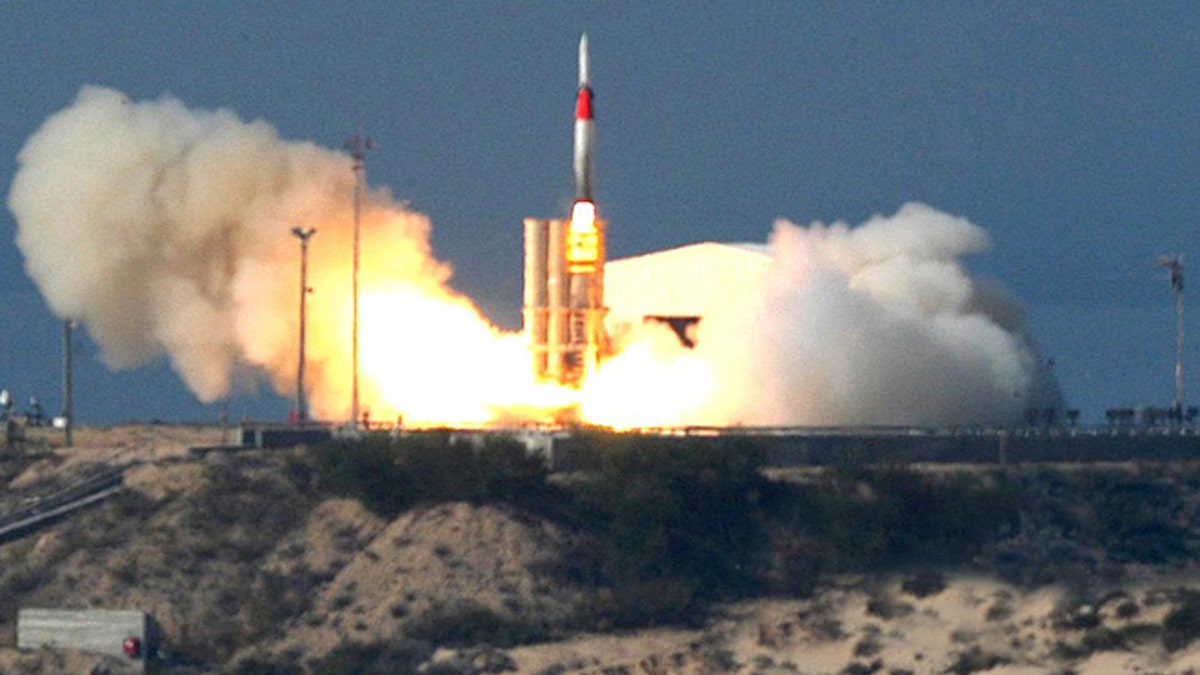
This file photo, taken on Friday Dec. 2, 2005, released by Israel Aircraft Industries Ltd., shows an Arrow missile being launched at an undisclosed location in Israel. Israel and the U.S. conducted a joint missile test over the Mediterranean on Tuesday, Sept. 3, 2013, an apparent display of military prowess as the Obama administration seeks congressional support for strikes against the regime of Syrian President Bashar Assad. A Sparrow missile was launched successfully at 9:15 a.m. and followed its planned trajectory. The Arrow missile defense system successful detected and tracked the target, the ministry said. (AP/Israel Aircraft Industries)
Israel has acknowledged firing an upgraded Sparrow missile from an Israeli warplane Tuesday in a launch meant to test the country's Arrow anti-missile system.
The Israeli Defense Ministry confirmed to Reuters that the test -- which was coordinated with the United States Defense Department -- was conducted at approximately 9:15 a.m. local time (2:15 a.m. ET) Tuesday, about the same time that Russia's Interfax news agency reported that the launch was detected by a radar station at Armavir, near the Black Sea.
Russia's state-owned news agency RIA originally said radar detected two ballistic 'objects' that were fired from the central Mediterranean Sea. Originally, a spokeswoman for the Israeli military told Reuters that Israel was "not aware of such an event having occurred." However, approximately an hour later, Israel acknowledged that it fired a new Sparrow missile.
“This is the first flight out test of this new version of the Sparrow, and was conducted at Israeli test range over the Mediterranean sea,” the Defense Ministry said in a statement, according to The Times of Israel. “All the elements of the system performed according to their operational configuration."
The Sparrow is a medium-range guided missile that can be launched either from the surface or the air to hit aerial targets, according to the manufacturer.
The Israeli Defense Ministry said the missile followed its planned trajectory, while the U.S.-funded Arrow missile defense system successfully detected and tracked the target, the ministry said.
Pentagon Press Secretary George Little said in a statement Tuesday that the test was "long planned to help evaluate the Arrow Ballistic Missile Defense system's ability to detect, track, and communicate information about a simulated threat to Israel."
But U.S. officials earlier told Fox News that senior Pentagon leadership was unaware of plans to test part of the missile defense system on Tuesday. The officials said the U.S. Missile Defense Agency may have played a role in the test.
"This test had nothing to do with United States consideration of military action to respond to Syria's chemical weapons attack," Little added.
Arrow designer Uzi Rabin told Reuters that tests of the system are usually planned "long in advance" and go unnoticed.
"What apparently made the difference today is the high state of tension over Syria and Russia's unusual vigilance," he said.
Initial speculation that Syria was the target of the missiles proved premature after the Russian embassy in Damascus reported no explosions or sign of a missile attack in the Syrian capital, according to the Itar-Tass news agency. An RIA source in Damascus had reported that objects fell into the sea.
On Tuesday, Israeli Prime Minister Benjamin Netanyahu called his country's missile defense systems a "wall of iron," according to Reuters.
"These things give us the power to protect ourselves, and anyone who considers harming us would do best not to," he said during a speech.
The report of the missile test is likely to further increase tensions in the region as President Barack Obama is due to arrive in Russia Tuesday for the G20 summit. The U.S. and Russia have clashed over the proper course of action in the wake of a reported chemical attack by forces loyal to Syria President Bashar Assad last month. On Monday, Russia Foreign Minister Sergey Lavrov said the evidence of the attack presented by the U.S. and its allies was "utterly unconvincing."
A defense ministry official has also criticized the United States for deploying warships so close to the Syria coast. At least three U.S. ships are already in the eastern Mediterranean, while the USS Nimitz carrier group, which includes four destroyers, has been moved from the Indian Ocean to the Red Sea. In response, Interfax reported on Monday that Russia would be sending a reconnaissance ship to the eastern Mediterranean.
The Associated Press contributed to this report.
